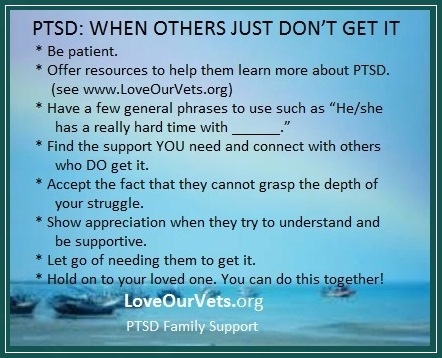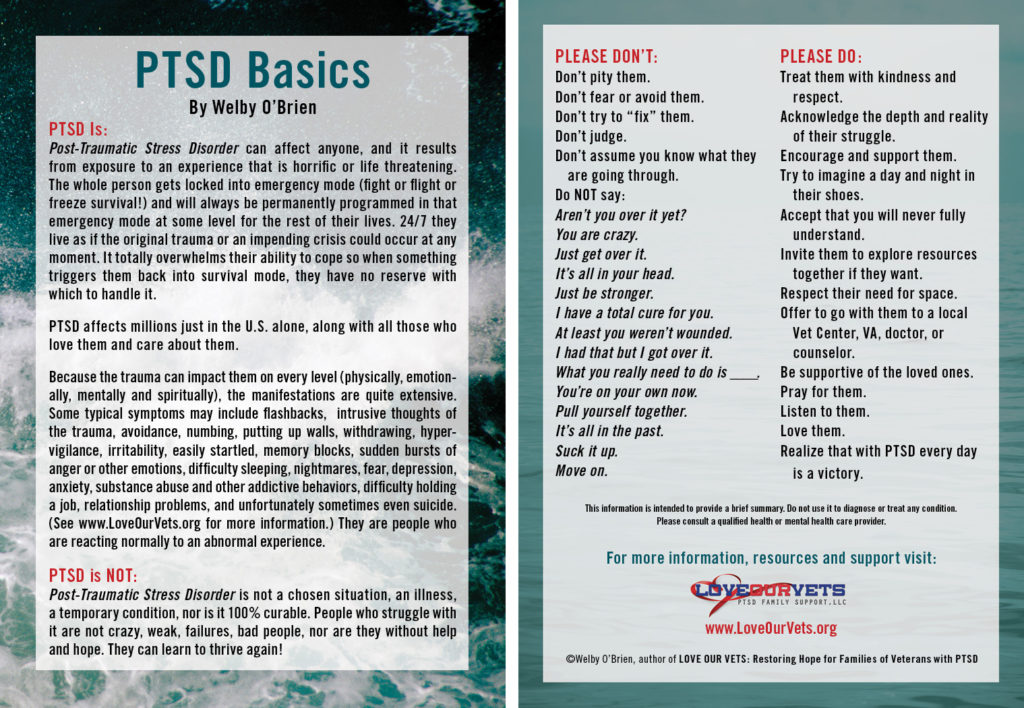“I had PTSD but I got over it.” Wow! Really???!? That comment was made by someone in a prominent government position. How about this one: “You have PTSD…at least you weren’t wounded.” Ouch. More insensitive ignorant words from someone (believe it or not) in a veterans organization. How do we as loved ones help our vets, and those we love who struggle with PTSD, handle these hurtful words and how do we ourselves respond?
As a wife of a 100% disabled veteran with PTSD, I am learning that there are some things we can do and then just have to let the rest go. Sure we get frustrated when others just don’t get it. We want to shake some sense and some compassion into them! And we ache for our beloved vets who just want to be recognized and honored for their sacrifices. A little acknowledgement and a few words of appreciation go a long way!
I was asked recently to sum up PTSD in one sentence. So I managed to get it into four. Posttraumatic stress disorder results from exposure to a severe trauma that is so horrendous it locks them into permanent survival mode, and overwhelms their ability to cope. For the rest of their lives they will live as if an impending crisis could occur at any moment. So when something triggers them, they have no reserve with which to handle it. It is a normal reaction to an abnormal event. This is a simple way to “explain” it without going into details.
Sometimes a helpful graphic we can show them will go a long way towards helping them get it. Feel free to download PTSD Basics and share.
Encourage others to learn more. And then just accept the fact that most people will not get it, unless they live with it as we do.
A second thing that is important for those of us who are loved ones is to connect with others who do understand. The encouragement gained from shared experiences, including the pain and the joy, are invaluable. Our Love Our Vets peer support group as well as the many PTSD and veteran support pages on Facebook are great ways to connect. We all speak the same language, and no one intentionally spouts out hurtful and insensitive comments.
Thirdly, we can give love and support and encouragement to our vets and our soldiers who still serve. The book Love Our Vets: Restoring Hope for Families of Veterans with PTSD shares many practical ways we can build them up while at the same time take good care of our own needs.
Even though we cannot fix it all (darn!) or totally educate others about PTSD, the more we can help them be informed, the better things will go. A close relative of mine recently read the book Love Our Vets. Her first response was heartfelt remorse. “I owe him a huge apology. I had no idea! And I will never again belittle him for anything he does.” Wow.
Our vets deserve the very best, and we can help them and help others see that they get it!

.




